Professionalism in Nursing: Theories, Reflection, and Analysis
VerifiedAdded on 2023/06/04
|9
|2376
|488
Essay
AI Summary
This essay delves into the multifaceted concept of professionalism in nursing, examining its core values, ethical considerations, and practical applications. It begins by defining professional nursing and highlighting essential non-clinical skills such as compassion, respect, and patient-centered care. The essay then critically analyzes the guiding values of professional nursing, including respect for human dignity, integrity, altruism, and justice, and discusses the positive and negative implications of these values in clinical practice. Furthermore, the essay explores prominent theories and models of professional nursing, such as Benner's stages of clinical competence and the Dreyfus model of skill acquisition, providing insights into how nurses develop expertise and navigate various stages of their careers. A significant portion of the essay is dedicated to personal reflection, utilizing Rolfe's reflective model to analyze the author's experiences as a graduate nurse, addressing challenges encountered, and outlining strategies for professional development. The conclusion emphasizes the importance of professionalism in nursing to ensure patient safety and improve the quality of care, encouraging nurses to uphold professional standards, ethical principles, and personal values.
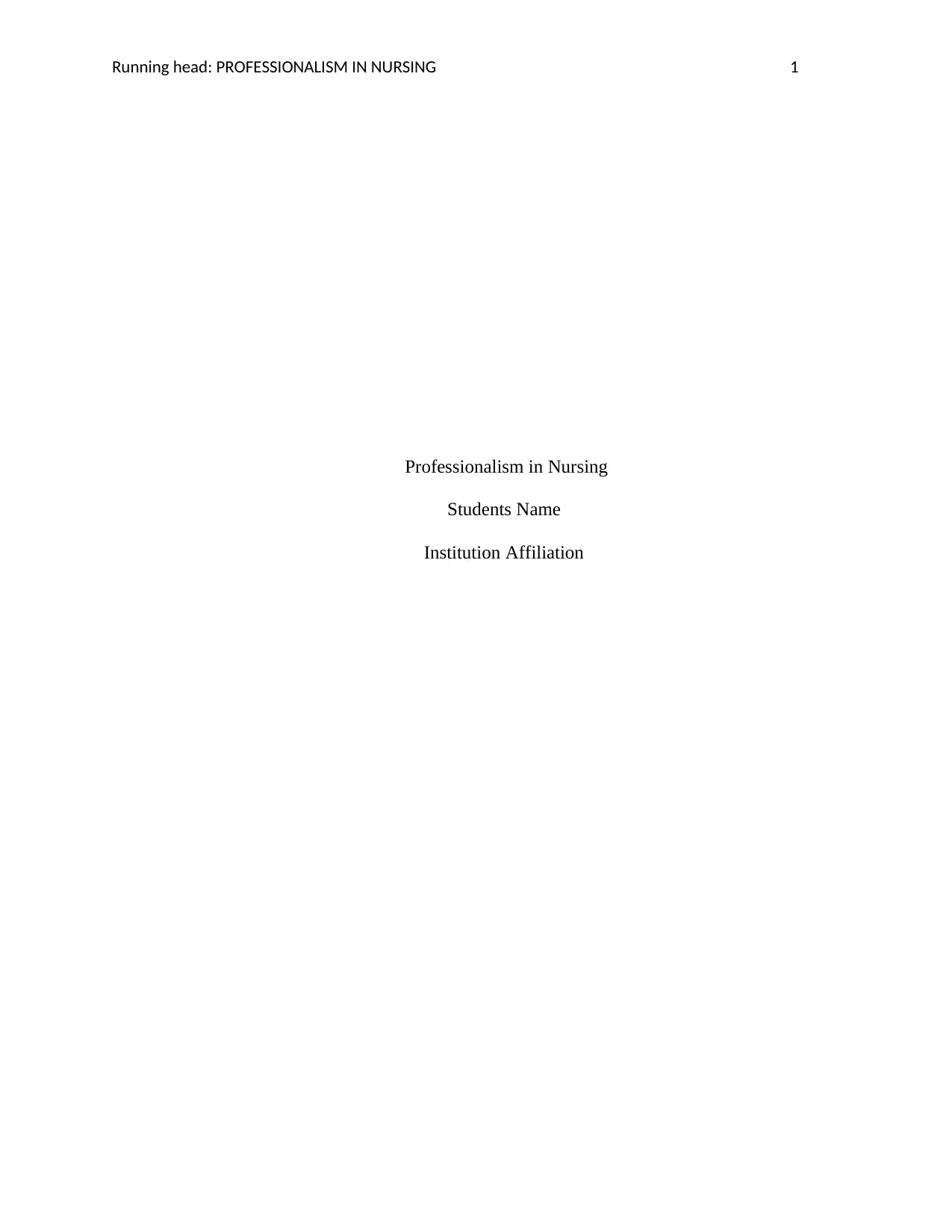
Running head: PROFESSIONALISM IN NURSING 1
Professionalism in Nursing
Students Name
Institution Affiliation
Professionalism in Nursing
Students Name
Institution Affiliation
Paraphrase This Document
Need a fresh take? Get an instant paraphrase of this document with our AI Paraphraser
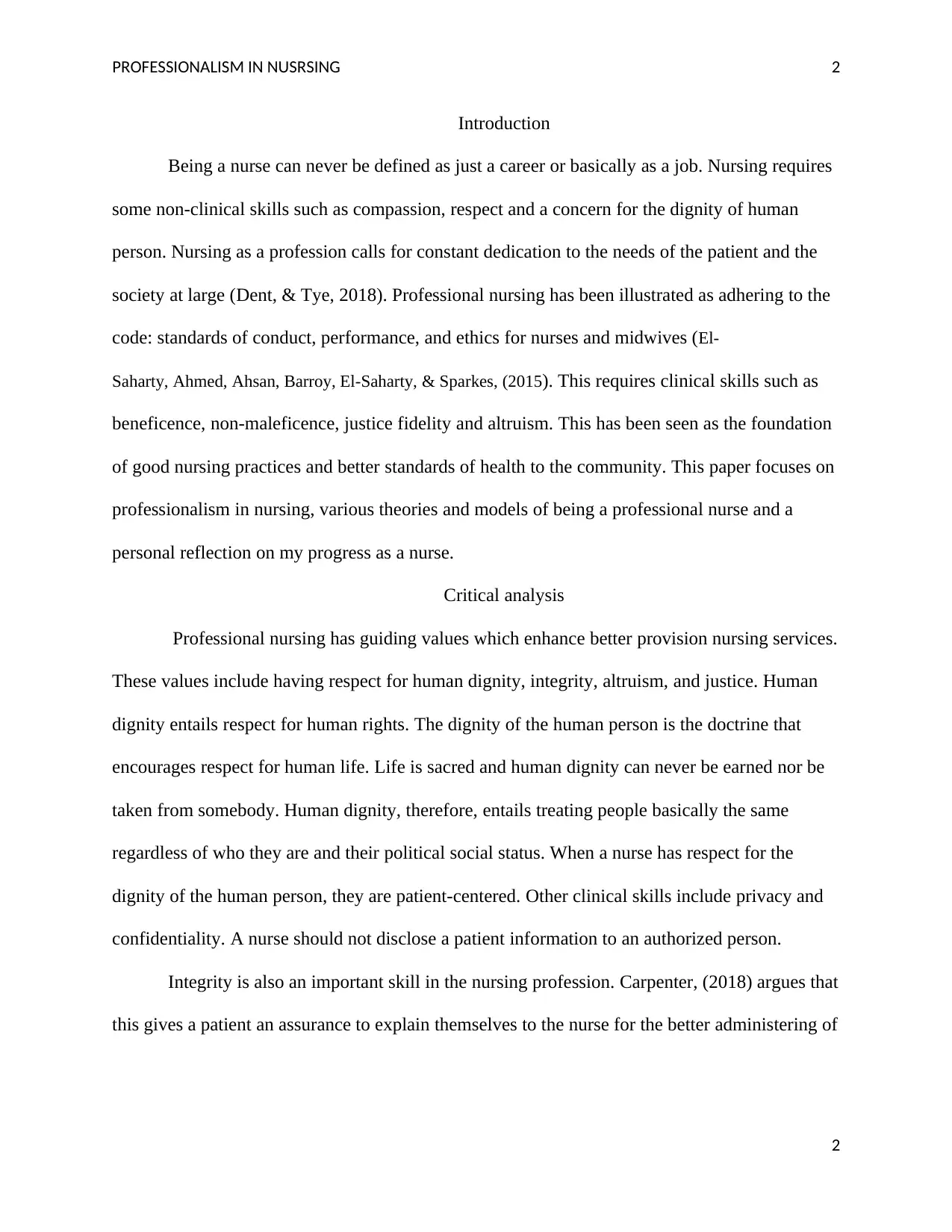
PROFESSIONALISM IN NUSRSING 2
Introduction
Being a nurse can never be defined as just a career or basically as a job. Nursing requires
some non-clinical skills such as compassion, respect and a concern for the dignity of human
person. Nursing as a profession calls for constant dedication to the needs of the patient and the
society at large (Dent, & Tye, 2018). Professional nursing has been illustrated as adhering to the
code: standards of conduct, performance, and ethics for nurses and midwives (El-
Saharty, Ahmed, Ahsan, Barroy, El-Saharty, & Sparkes, (2015). This requires clinical skills such as
beneficence, non-maleficence, justice fidelity and altruism. This has been seen as the foundation
of good nursing practices and better standards of health to the community. This paper focuses on
professionalism in nursing, various theories and models of being a professional nurse and a
personal reflection on my progress as a nurse.
Critical analysis
Professional nursing has guiding values which enhance better provision nursing services.
These values include having respect for human dignity, integrity, altruism, and justice. Human
dignity entails respect for human rights. The dignity of the human person is the doctrine that
encourages respect for human life. Life is sacred and human dignity can never be earned nor be
taken from somebody. Human dignity, therefore, entails treating people basically the same
regardless of who they are and their political social status. When a nurse has respect for the
dignity of the human person, they are patient-centered. Other clinical skills include privacy and
confidentiality. A nurse should not disclose a patient information to an authorized person.
Integrity is also an important skill in the nursing profession. Carpenter, (2018) argues that
this gives a patient an assurance to explain themselves to the nurse for the better administering of
2
Introduction
Being a nurse can never be defined as just a career or basically as a job. Nursing requires
some non-clinical skills such as compassion, respect and a concern for the dignity of human
person. Nursing as a profession calls for constant dedication to the needs of the patient and the
society at large (Dent, & Tye, 2018). Professional nursing has been illustrated as adhering to the
code: standards of conduct, performance, and ethics for nurses and midwives (El-
Saharty, Ahmed, Ahsan, Barroy, El-Saharty, & Sparkes, (2015). This requires clinical skills such as
beneficence, non-maleficence, justice fidelity and altruism. This has been seen as the foundation
of good nursing practices and better standards of health to the community. This paper focuses on
professionalism in nursing, various theories and models of being a professional nurse and a
personal reflection on my progress as a nurse.
Critical analysis
Professional nursing has guiding values which enhance better provision nursing services.
These values include having respect for human dignity, integrity, altruism, and justice. Human
dignity entails respect for human rights. The dignity of the human person is the doctrine that
encourages respect for human life. Life is sacred and human dignity can never be earned nor be
taken from somebody. Human dignity, therefore, entails treating people basically the same
regardless of who they are and their political social status. When a nurse has respect for the
dignity of the human person, they are patient-centered. Other clinical skills include privacy and
confidentiality. A nurse should not disclose a patient information to an authorized person.
Integrity is also an important skill in the nursing profession. Carpenter, (2018) argues that
this gives a patient an assurance to explain themselves to the nurse for the better administering of
2
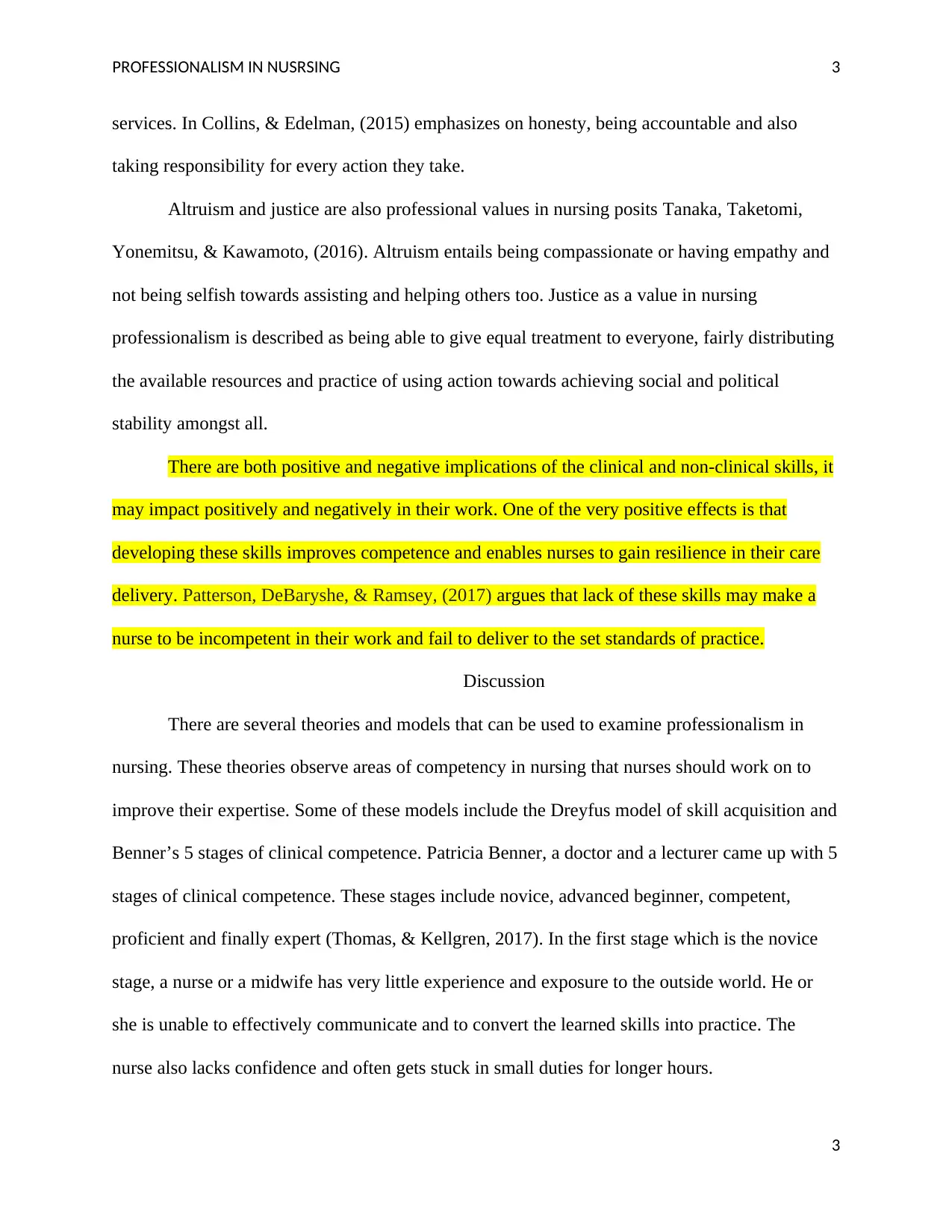
PROFESSIONALISM IN NUSRSING 3
services. In Collins, & Edelman, (2015) emphasizes on honesty, being accountable and also
taking responsibility for every action they take.
Altruism and justice are also professional values in nursing posits Tanaka, Taketomi,
Yonemitsu, & Kawamoto, (2016). Altruism entails being compassionate or having empathy and
not being selfish towards assisting and helping others too. Justice as a value in nursing
professionalism is described as being able to give equal treatment to everyone, fairly distributing
the available resources and practice of using action towards achieving social and political
stability amongst all.
There are both positive and negative implications of the clinical and non-clinical skills, it
may impact positively and negatively in their work. One of the very positive effects is that
developing these skills improves competence and enables nurses to gain resilience in their care
delivery. Patterson, DeBaryshe, & Ramsey, (2017) argues that lack of these skills may make a
nurse to be incompetent in their work and fail to deliver to the set standards of practice.
Discussion
There are several theories and models that can be used to examine professionalism in
nursing. These theories observe areas of competency in nursing that nurses should work on to
improve their expertise. Some of these models include the Dreyfus model of skill acquisition and
Benner’s 5 stages of clinical competence. Patricia Benner, a doctor and a lecturer came up with 5
stages of clinical competence. These stages include novice, advanced beginner, competent,
proficient and finally expert (Thomas, & Kellgren, 2017). In the first stage which is the novice
stage, a nurse or a midwife has very little experience and exposure to the outside world. He or
she is unable to effectively communicate and to convert the learned skills into practice. The
nurse also lacks confidence and often gets stuck in small duties for longer hours.
3
services. In Collins, & Edelman, (2015) emphasizes on honesty, being accountable and also
taking responsibility for every action they take.
Altruism and justice are also professional values in nursing posits Tanaka, Taketomi,
Yonemitsu, & Kawamoto, (2016). Altruism entails being compassionate or having empathy and
not being selfish towards assisting and helping others too. Justice as a value in nursing
professionalism is described as being able to give equal treatment to everyone, fairly distributing
the available resources and practice of using action towards achieving social and political
stability amongst all.
There are both positive and negative implications of the clinical and non-clinical skills, it
may impact positively and negatively in their work. One of the very positive effects is that
developing these skills improves competence and enables nurses to gain resilience in their care
delivery. Patterson, DeBaryshe, & Ramsey, (2017) argues that lack of these skills may make a
nurse to be incompetent in their work and fail to deliver to the set standards of practice.
Discussion
There are several theories and models that can be used to examine professionalism in
nursing. These theories observe areas of competency in nursing that nurses should work on to
improve their expertise. Some of these models include the Dreyfus model of skill acquisition and
Benner’s 5 stages of clinical competence. Patricia Benner, a doctor and a lecturer came up with 5
stages of clinical competence. These stages include novice, advanced beginner, competent,
proficient and finally expert (Thomas, & Kellgren, 2017). In the first stage which is the novice
stage, a nurse or a midwife has very little experience and exposure to the outside world. He or
she is unable to effectively communicate and to convert the learned skills into practice. The
nurse also lacks confidence and often gets stuck in small duties for longer hours.
3
⊘ This is a preview!⊘
Do you want full access?
Subscribe today to unlock all pages.

Trusted by 1+ million students worldwide
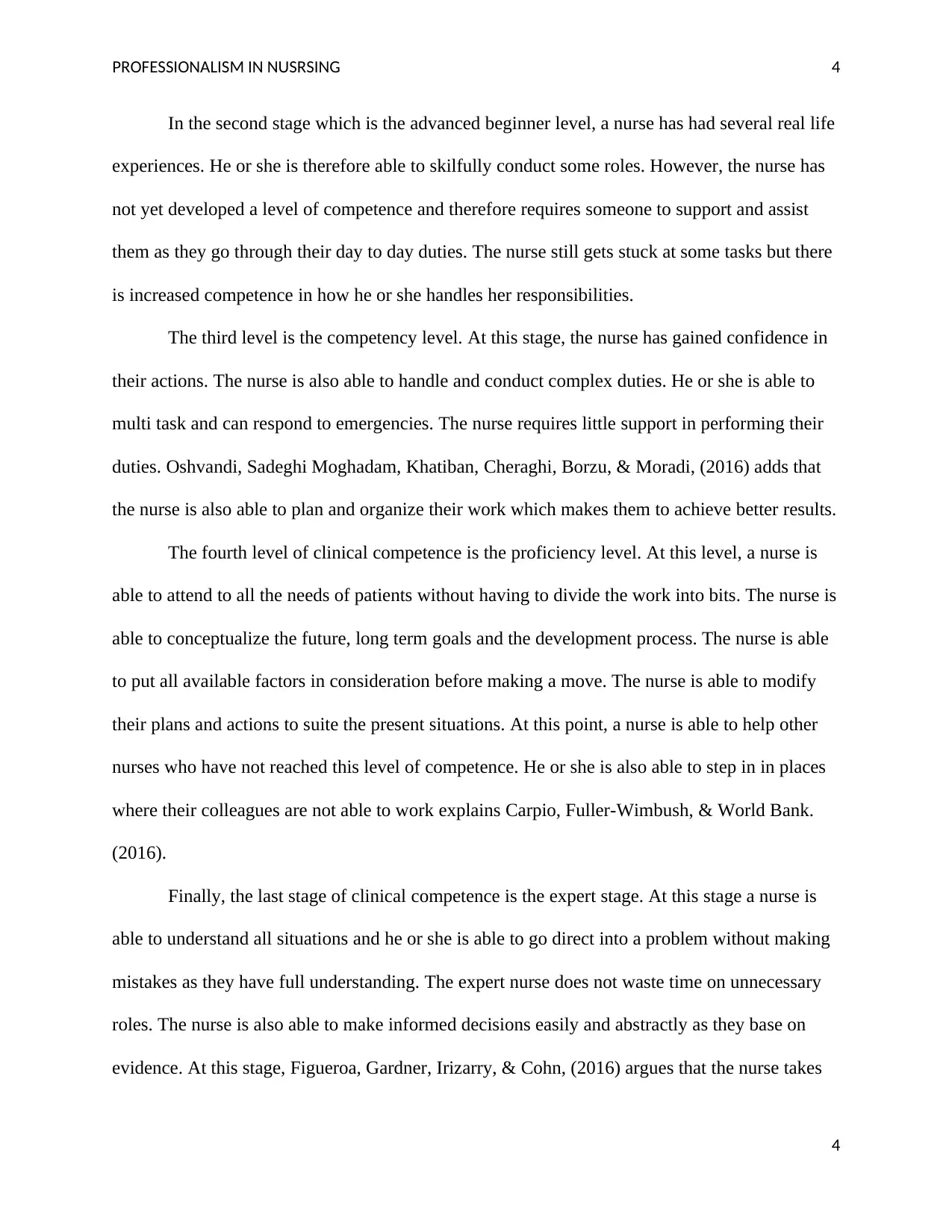
PROFESSIONALISM IN NUSRSING 4
In the second stage which is the advanced beginner level, a nurse has had several real life
experiences. He or she is therefore able to skilfully conduct some roles. However, the nurse has
not yet developed a level of competence and therefore requires someone to support and assist
them as they go through their day to day duties. The nurse still gets stuck at some tasks but there
is increased competence in how he or she handles her responsibilities.
The third level is the competency level. At this stage, the nurse has gained confidence in
their actions. The nurse is also able to handle and conduct complex duties. He or she is able to
multi task and can respond to emergencies. The nurse requires little support in performing their
duties. Oshvandi, Sadeghi Moghadam, Khatiban, Cheraghi, Borzu, & Moradi, (2016) adds that
the nurse is also able to plan and organize their work which makes them to achieve better results.
The fourth level of clinical competence is the proficiency level. At this level, a nurse is
able to attend to all the needs of patients without having to divide the work into bits. The nurse is
able to conceptualize the future, long term goals and the development process. The nurse is able
to put all available factors in consideration before making a move. The nurse is able to modify
their plans and actions to suite the present situations. At this point, a nurse is able to help other
nurses who have not reached this level of competence. He or she is also able to step in in places
where their colleagues are not able to work explains Carpio, Fuller-Wimbush, & World Bank.
(2016).
Finally, the last stage of clinical competence is the expert stage. At this stage a nurse is
able to understand all situations and he or she is able to go direct into a problem without making
mistakes as they have full understanding. The expert nurse does not waste time on unnecessary
roles. The nurse is also able to make informed decisions easily and abstractly as they base on
evidence. At this stage, Figueroa, Gardner, Irizarry, & Cohn, (2016) argues that the nurse takes
4
In the second stage which is the advanced beginner level, a nurse has had several real life
experiences. He or she is therefore able to skilfully conduct some roles. However, the nurse has
not yet developed a level of competence and therefore requires someone to support and assist
them as they go through their day to day duties. The nurse still gets stuck at some tasks but there
is increased competence in how he or she handles her responsibilities.
The third level is the competency level. At this stage, the nurse has gained confidence in
their actions. The nurse is also able to handle and conduct complex duties. He or she is able to
multi task and can respond to emergencies. The nurse requires little support in performing their
duties. Oshvandi, Sadeghi Moghadam, Khatiban, Cheraghi, Borzu, & Moradi, (2016) adds that
the nurse is also able to plan and organize their work which makes them to achieve better results.
The fourth level of clinical competence is the proficiency level. At this level, a nurse is
able to attend to all the needs of patients without having to divide the work into bits. The nurse is
able to conceptualize the future, long term goals and the development process. The nurse is able
to put all available factors in consideration before making a move. The nurse is able to modify
their plans and actions to suite the present situations. At this point, a nurse is able to help other
nurses who have not reached this level of competence. He or she is also able to step in in places
where their colleagues are not able to work explains Carpio, Fuller-Wimbush, & World Bank.
(2016).
Finally, the last stage of clinical competence is the expert stage. At this stage a nurse is
able to understand all situations and he or she is able to go direct into a problem without making
mistakes as they have full understanding. The expert nurse does not waste time on unnecessary
roles. The nurse is also able to make informed decisions easily and abstractly as they base on
evidence. At this stage, Figueroa, Gardner, Irizarry, & Cohn, (2016) argues that the nurse takes
4
Paraphrase This Document
Need a fresh take? Get an instant paraphrase of this document with our AI Paraphraser
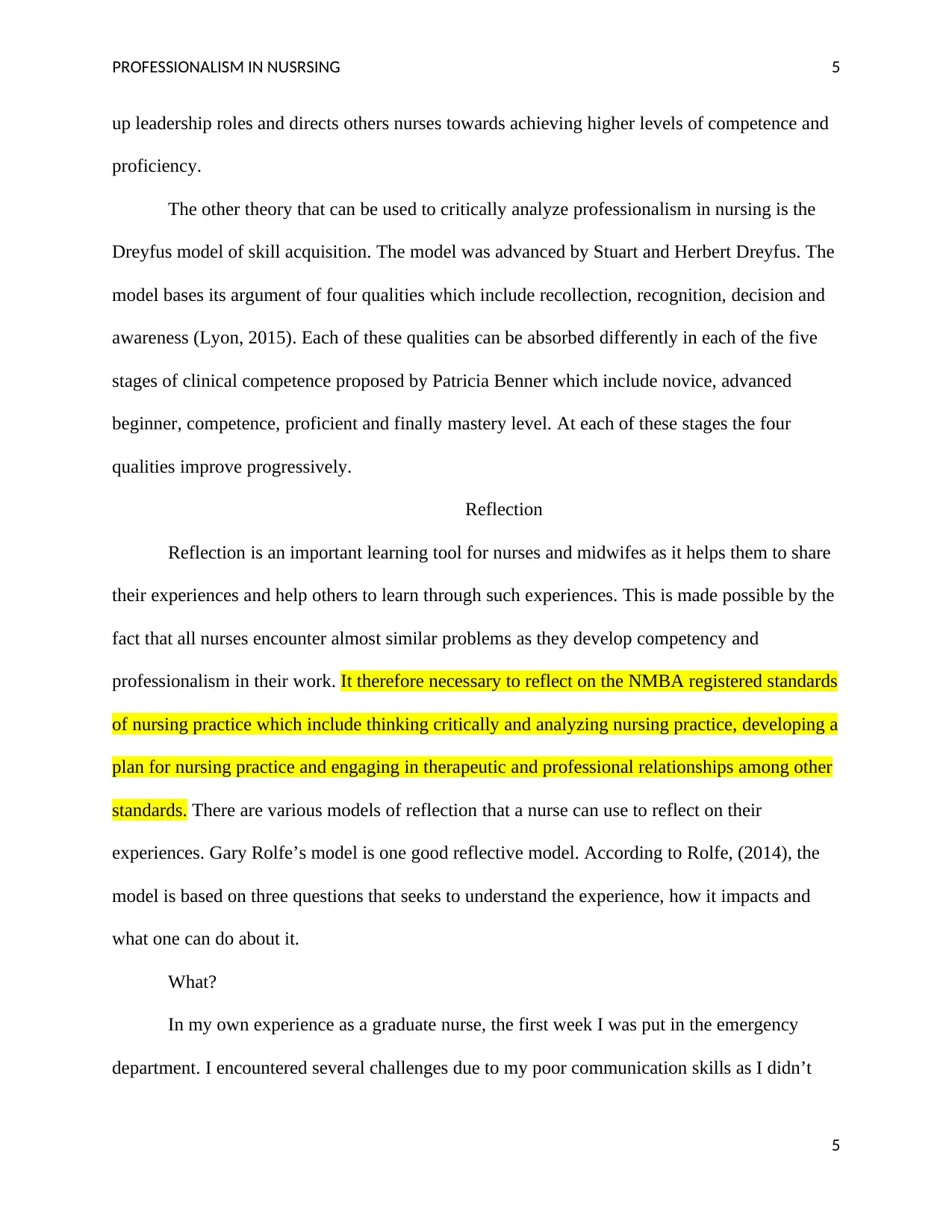
PROFESSIONALISM IN NUSRSING 5
up leadership roles and directs others nurses towards achieving higher levels of competence and
proficiency.
The other theory that can be used to critically analyze professionalism in nursing is the
Dreyfus model of skill acquisition. The model was advanced by Stuart and Herbert Dreyfus. The
model bases its argument of four qualities which include recollection, recognition, decision and
awareness (Lyon, 2015). Each of these qualities can be absorbed differently in each of the five
stages of clinical competence proposed by Patricia Benner which include novice, advanced
beginner, competence, proficient and finally mastery level. At each of these stages the four
qualities improve progressively.
Reflection
Reflection is an important learning tool for nurses and midwifes as it helps them to share
their experiences and help others to learn through such experiences. This is made possible by the
fact that all nurses encounter almost similar problems as they develop competency and
professionalism in their work. It therefore necessary to reflect on the NMBA registered standards
of nursing practice which include thinking critically and analyzing nursing practice, developing a
plan for nursing practice and engaging in therapeutic and professional relationships among other
standards. There are various models of reflection that a nurse can use to reflect on their
experiences. Gary Rolfe’s model is one good reflective model. According to Rolfe, (2014), the
model is based on three questions that seeks to understand the experience, how it impacts and
what one can do about it.
What?
In my own experience as a graduate nurse, the first week I was put in the emergency
department. I encountered several challenges due to my poor communication skills as I didn’t
5
up leadership roles and directs others nurses towards achieving higher levels of competence and
proficiency.
The other theory that can be used to critically analyze professionalism in nursing is the
Dreyfus model of skill acquisition. The model was advanced by Stuart and Herbert Dreyfus. The
model bases its argument of four qualities which include recollection, recognition, decision and
awareness (Lyon, 2015). Each of these qualities can be absorbed differently in each of the five
stages of clinical competence proposed by Patricia Benner which include novice, advanced
beginner, competence, proficient and finally mastery level. At each of these stages the four
qualities improve progressively.
Reflection
Reflection is an important learning tool for nurses and midwifes as it helps them to share
their experiences and help others to learn through such experiences. This is made possible by the
fact that all nurses encounter almost similar problems as they develop competency and
professionalism in their work. It therefore necessary to reflect on the NMBA registered standards
of nursing practice which include thinking critically and analyzing nursing practice, developing a
plan for nursing practice and engaging in therapeutic and professional relationships among other
standards. There are various models of reflection that a nurse can use to reflect on their
experiences. Gary Rolfe’s model is one good reflective model. According to Rolfe, (2014), the
model is based on three questions that seeks to understand the experience, how it impacts and
what one can do about it.
What?
In my own experience as a graduate nurse, the first week I was put in the emergency
department. I encountered several challenges due to my poor communication skills as I didn’t
5
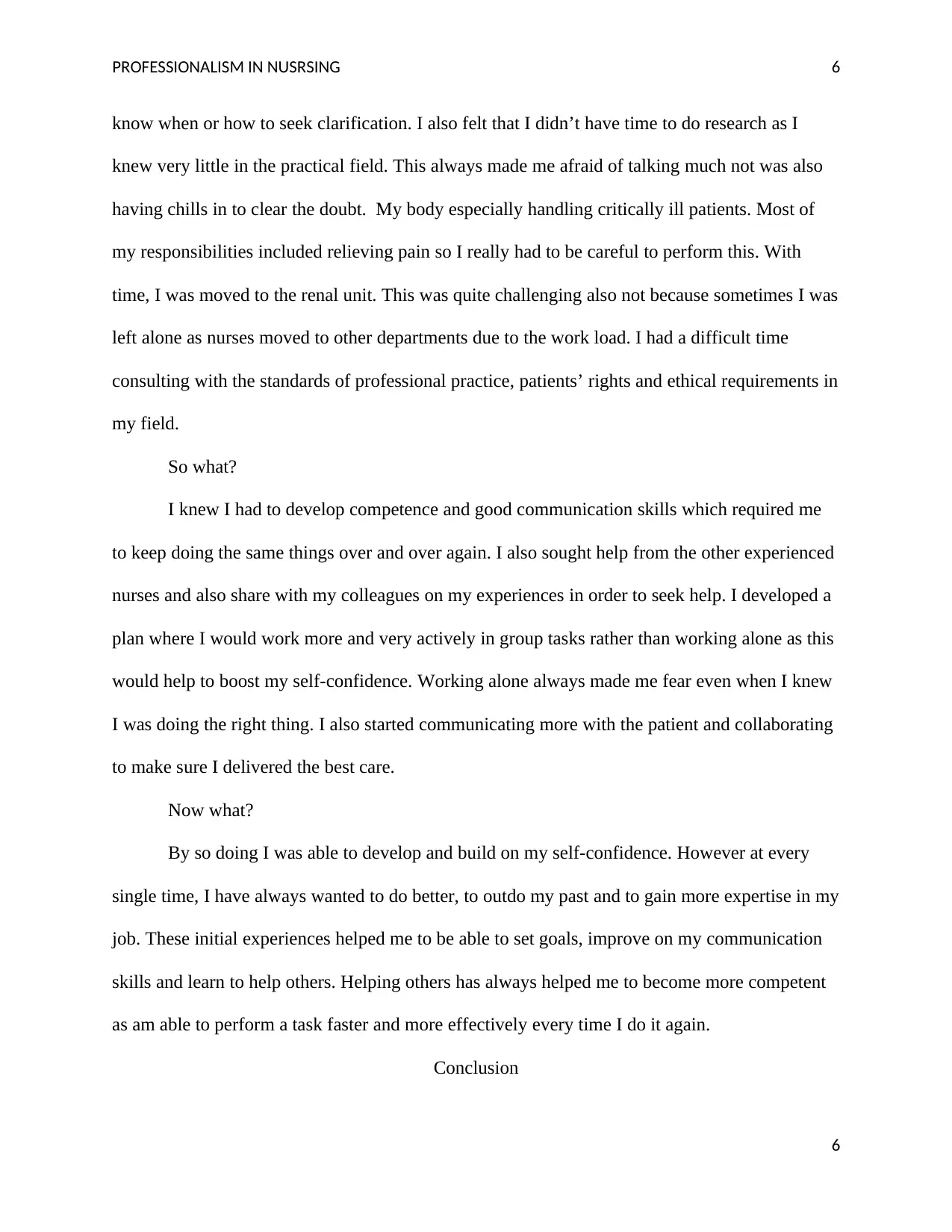
PROFESSIONALISM IN NUSRSING 6
know when or how to seek clarification. I also felt that I didn’t have time to do research as I
knew very little in the practical field. This always made me afraid of talking much not was also
having chills in to clear the doubt. My body especially handling critically ill patients. Most of
my responsibilities included relieving pain so I really had to be careful to perform this. With
time, I was moved to the renal unit. This was quite challenging also not because sometimes I was
left alone as nurses moved to other departments due to the work load. I had a difficult time
consulting with the standards of professional practice, patients’ rights and ethical requirements in
my field.
So what?
I knew I had to develop competence and good communication skills which required me
to keep doing the same things over and over again. I also sought help from the other experienced
nurses and also share with my colleagues on my experiences in order to seek help. I developed a
plan where I would work more and very actively in group tasks rather than working alone as this
would help to boost my self-confidence. Working alone always made me fear even when I knew
I was doing the right thing. I also started communicating more with the patient and collaborating
to make sure I delivered the best care.
Now what?
By so doing I was able to develop and build on my self-confidence. However at every
single time, I have always wanted to do better, to outdo my past and to gain more expertise in my
job. These initial experiences helped me to be able to set goals, improve on my communication
skills and learn to help others. Helping others has always helped me to become more competent
as am able to perform a task faster and more effectively every time I do it again.
Conclusion
6
know when or how to seek clarification. I also felt that I didn’t have time to do research as I
knew very little in the practical field. This always made me afraid of talking much not was also
having chills in to clear the doubt. My body especially handling critically ill patients. Most of
my responsibilities included relieving pain so I really had to be careful to perform this. With
time, I was moved to the renal unit. This was quite challenging also not because sometimes I was
left alone as nurses moved to other departments due to the work load. I had a difficult time
consulting with the standards of professional practice, patients’ rights and ethical requirements in
my field.
So what?
I knew I had to develop competence and good communication skills which required me
to keep doing the same things over and over again. I also sought help from the other experienced
nurses and also share with my colleagues on my experiences in order to seek help. I developed a
plan where I would work more and very actively in group tasks rather than working alone as this
would help to boost my self-confidence. Working alone always made me fear even when I knew
I was doing the right thing. I also started communicating more with the patient and collaborating
to make sure I delivered the best care.
Now what?
By so doing I was able to develop and build on my self-confidence. However at every
single time, I have always wanted to do better, to outdo my past and to gain more expertise in my
job. These initial experiences helped me to be able to set goals, improve on my communication
skills and learn to help others. Helping others has always helped me to become more competent
as am able to perform a task faster and more effectively every time I do it again.
Conclusion
6
⊘ This is a preview!⊘
Do you want full access?
Subscribe today to unlock all pages.

Trusted by 1+ million students worldwide
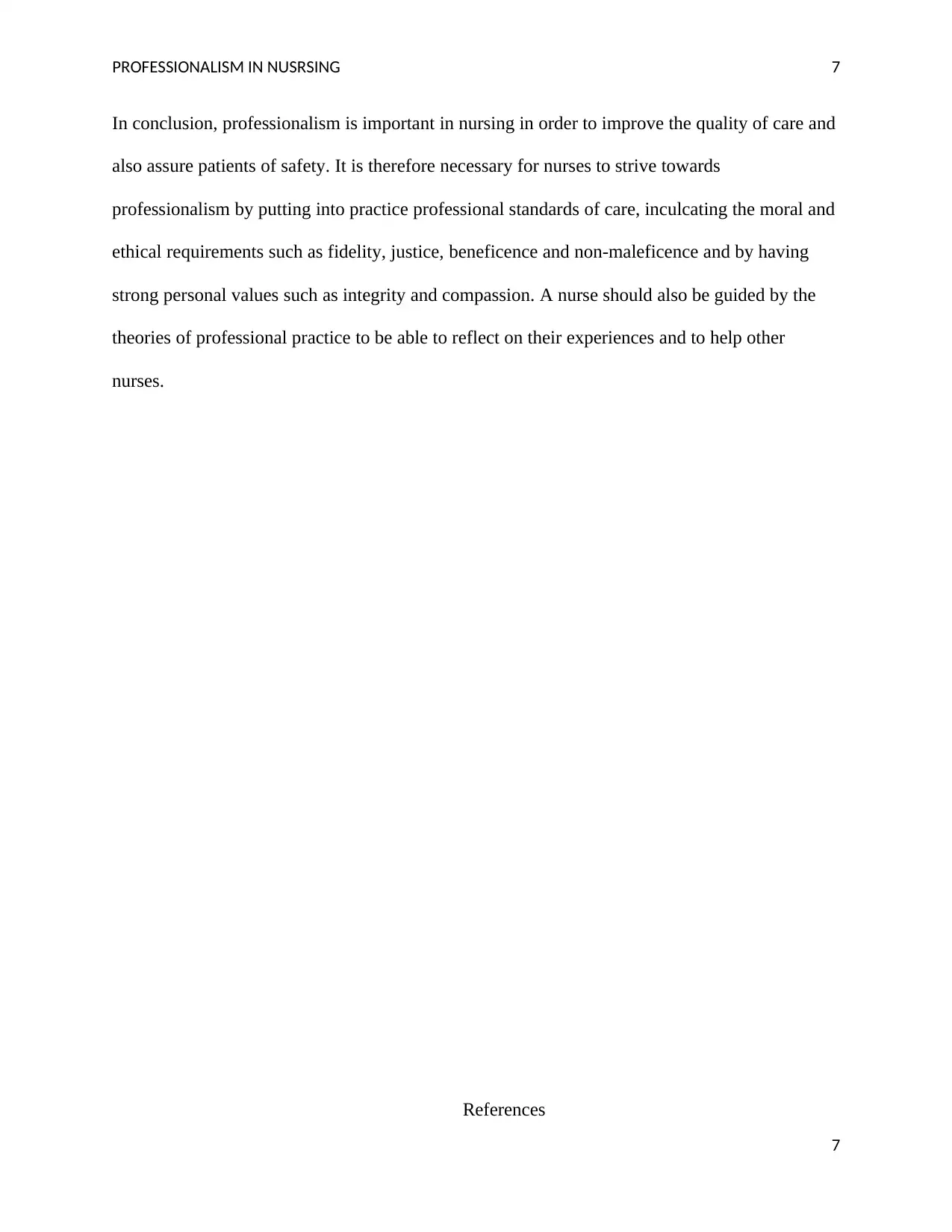
PROFESSIONALISM IN NUSRSING 7
In conclusion, professionalism is important in nursing in order to improve the quality of care and
also assure patients of safety. It is therefore necessary for nurses to strive towards
professionalism by putting into practice professional standards of care, inculcating the moral and
ethical requirements such as fidelity, justice, beneficence and non-maleficence and by having
strong personal values such as integrity and compassion. A nurse should also be guided by the
theories of professional practice to be able to reflect on their experiences and to help other
nurses.
References
7
In conclusion, professionalism is important in nursing in order to improve the quality of care and
also assure patients of safety. It is therefore necessary for nurses to strive towards
professionalism by putting into practice professional standards of care, inculcating the moral and
ethical requirements such as fidelity, justice, beneficence and non-maleficence and by having
strong personal values such as integrity and compassion. A nurse should also be guided by the
theories of professional practice to be able to reflect on their experiences and to help other
nurses.
References
7
Paraphrase This Document
Need a fresh take? Get an instant paraphrase of this document with our AI Paraphraser
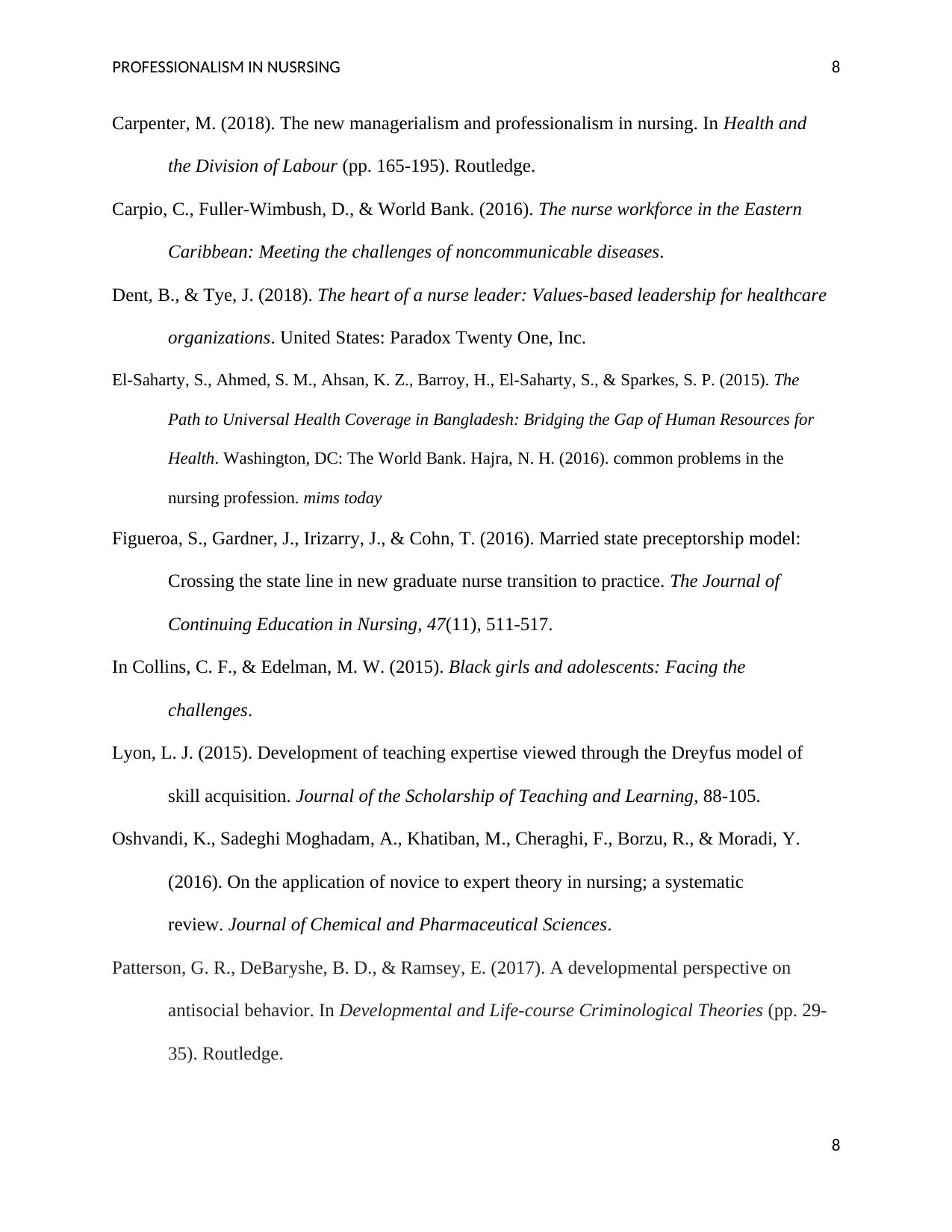
PROFESSIONALISM IN NUSRSING 8
Carpenter, M. (2018). The new managerialism and professionalism in nursing. In Health and
the Division of Labour (pp. 165-195). Routledge.
Carpio, C., Fuller-Wimbush, D., & World Bank. (2016). The nurse workforce in the Eastern
Caribbean: Meeting the challenges of noncommunicable diseases.
Dent, B., & Tye, J. (2018). The heart of a nurse leader: Values-based leadership for healthcare
organizations. United States: Paradox Twenty One, Inc.
El-Saharty, S., Ahmed, S. M., Ahsan, K. Z., Barroy, H., El-Saharty, S., & Sparkes, S. P. (2015). The
Path to Universal Health Coverage in Bangladesh: Bridging the Gap of Human Resources for
Health. Washington, DC: The World Bank. Hajra, N. H. (2016). common problems in the
nursing profession. mims today
Figueroa, S., Gardner, J., Irizarry, J., & Cohn, T. (2016). Married state preceptorship model:
Crossing the state line in new graduate nurse transition to practice. The Journal of
Continuing Education in Nursing, 47(11), 511-517.
In Collins, C. F., & Edelman, M. W. (2015). Black girls and adolescents: Facing the
challenges.
Lyon, L. J. (2015). Development of teaching expertise viewed through the Dreyfus model of
skill acquisition. Journal of the Scholarship of Teaching and Learning, 88-105.
Oshvandi, K., Sadeghi Moghadam, A., Khatiban, M., Cheraghi, F., Borzu, R., & Moradi, Y.
(2016). On the application of novice to expert theory in nursing; a systematic
review. Journal of Chemical and Pharmaceutical Sciences.
Patterson, G. R., DeBaryshe, B. D., & Ramsey, E. (2017). A developmental perspective on
antisocial behavior. In Developmental and Life-course Criminological Theories (pp. 29-
35). Routledge.
8
Carpenter, M. (2018). The new managerialism and professionalism in nursing. In Health and
the Division of Labour (pp. 165-195). Routledge.
Carpio, C., Fuller-Wimbush, D., & World Bank. (2016). The nurse workforce in the Eastern
Caribbean: Meeting the challenges of noncommunicable diseases.
Dent, B., & Tye, J. (2018). The heart of a nurse leader: Values-based leadership for healthcare
organizations. United States: Paradox Twenty One, Inc.
El-Saharty, S., Ahmed, S. M., Ahsan, K. Z., Barroy, H., El-Saharty, S., & Sparkes, S. P. (2015). The
Path to Universal Health Coverage in Bangladesh: Bridging the Gap of Human Resources for
Health. Washington, DC: The World Bank. Hajra, N. H. (2016). common problems in the
nursing profession. mims today
Figueroa, S., Gardner, J., Irizarry, J., & Cohn, T. (2016). Married state preceptorship model:
Crossing the state line in new graduate nurse transition to practice. The Journal of
Continuing Education in Nursing, 47(11), 511-517.
In Collins, C. F., & Edelman, M. W. (2015). Black girls and adolescents: Facing the
challenges.
Lyon, L. J. (2015). Development of teaching expertise viewed through the Dreyfus model of
skill acquisition. Journal of the Scholarship of Teaching and Learning, 88-105.
Oshvandi, K., Sadeghi Moghadam, A., Khatiban, M., Cheraghi, F., Borzu, R., & Moradi, Y.
(2016). On the application of novice to expert theory in nursing; a systematic
review. Journal of Chemical and Pharmaceutical Sciences.
Patterson, G. R., DeBaryshe, B. D., & Ramsey, E. (2017). A developmental perspective on
antisocial behavior. In Developmental and Life-course Criminological Theories (pp. 29-
35). Routledge.
8
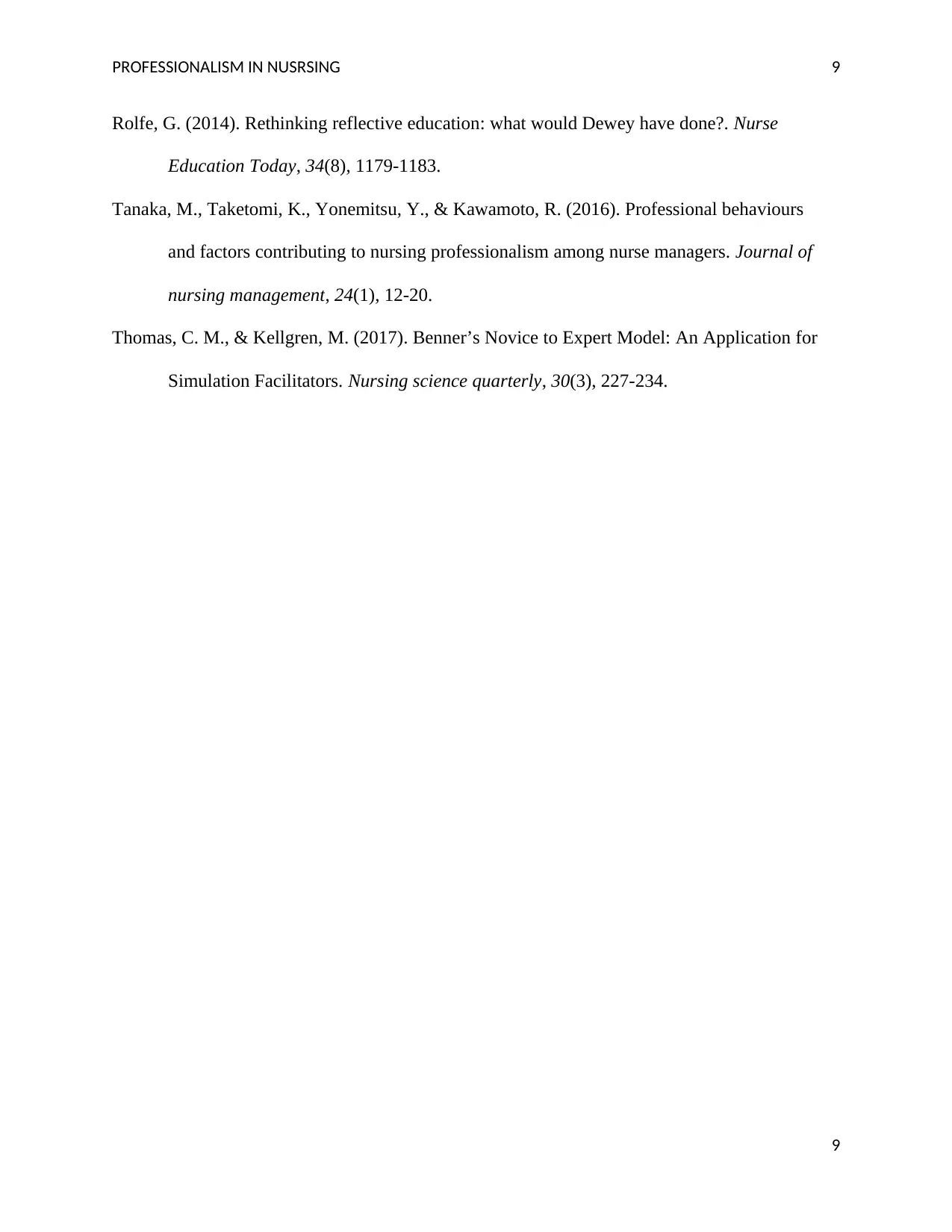
PROFESSIONALISM IN NUSRSING 9
Rolfe, G. (2014). Rethinking reflective education: what would Dewey have done?. Nurse
Education Today, 34(8), 1179-1183.
Tanaka, M., Taketomi, K., Yonemitsu, Y., & Kawamoto, R. (2016). Professional behaviours
and factors contributing to nursing professionalism among nurse managers. Journal of
nursing management, 24(1), 12-20.
Thomas, C. M., & Kellgren, M. (2017). Benner’s Novice to Expert Model: An Application for
Simulation Facilitators. Nursing science quarterly, 30(3), 227-234.
9
Rolfe, G. (2014). Rethinking reflective education: what would Dewey have done?. Nurse
Education Today, 34(8), 1179-1183.
Tanaka, M., Taketomi, K., Yonemitsu, Y., & Kawamoto, R. (2016). Professional behaviours
and factors contributing to nursing professionalism among nurse managers. Journal of
nursing management, 24(1), 12-20.
Thomas, C. M., & Kellgren, M. (2017). Benner’s Novice to Expert Model: An Application for
Simulation Facilitators. Nursing science quarterly, 30(3), 227-234.
9
⊘ This is a preview!⊘
Do you want full access?
Subscribe today to unlock all pages.

Trusted by 1+ million students worldwide
1 out of 9
Related Documents
Your All-in-One AI-Powered Toolkit for Academic Success.
+13062052269
info@desklib.com
Available 24*7 on WhatsApp / Email
![[object Object]](/_next/static/media/star-bottom.7253800d.svg)
Unlock your academic potential
Copyright © 2020–2025 A2Z Services. All Rights Reserved. Developed and managed by ZUCOL.




